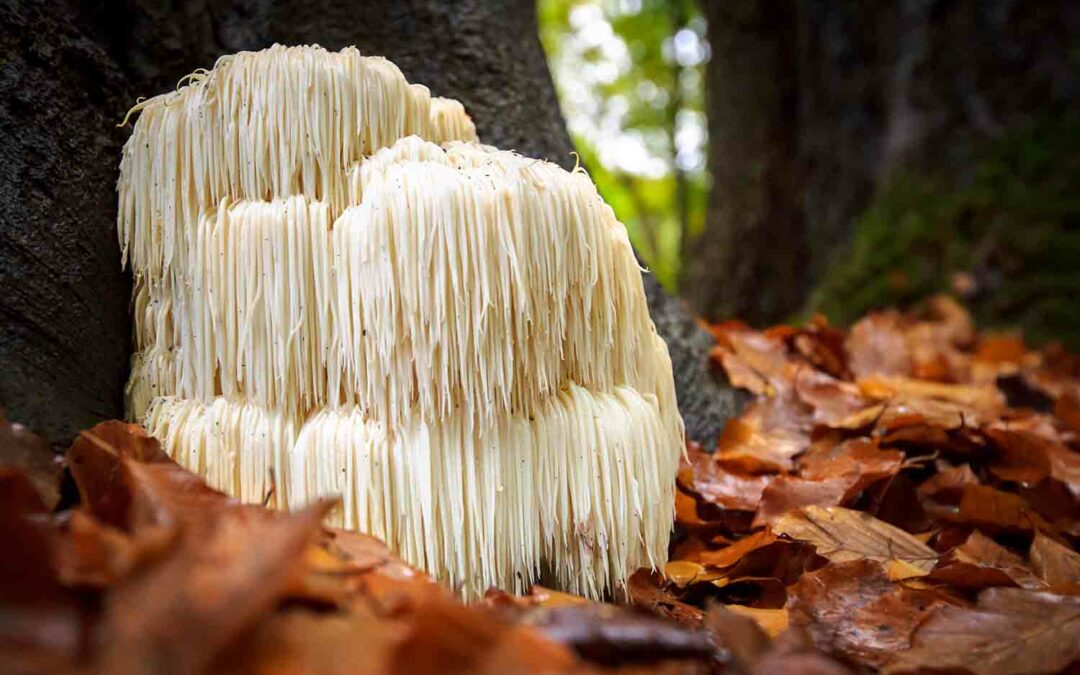The Mystical Lion’s Mane Mushroom
Throughout history, mankind has been fascinated by the mysteries and wonders of the natural world. Among the treasures that nature has bestowed upon us, certain mushrooms hold a special place, not just as a culinary delight but also as potential sources of various health benefits. One such intriguing mushroom is Lion’s Mane (Hericium erinaceus), also known as the “Pom Pom” or “Monkey Head” mushroom due to its unique appearance.
In this comprehensive article, we will embark on a captivating journey into the historical context, nutritional composition, and remarkable health benefits of Lion’s Mane mushroom. Join us as we unravel the secrets behind this remarkable fungus and explore how its consumption can contribute to our well-being.
I. Historical Context
Lion’s Mane mushroom has a rich historical background that spans centuries, particularly in traditional Asian medicine. Revered for its extraordinary appearance and medicinal properties, this fascinating mushroom has been documented in ancient texts, sculptures, and paintings throughout East Asia.
One of the earliest mentions of Lion’s Mane dates back to China’s Ming Dynasty (1368-1644), where it was regarded as a precious ingredient with potent healing powers. Known as “Hóu Tóu Gū” or “Monkey’s Head,” it was believed to enhance cognitive function, boost vitality, and promote overall well-being. Emperors and nobles treasured this mushroom, considering it a symbol of wisdom and longevity.
In Japan, Lion’s Mane mushroom was referred to as “Yamabushitake,” signifying the mushroom’s association with mountain-dwelling hermits, or “Yamabushi,” who sought enlightenment and spiritual growth. The hermits believed that consuming Lion’s Mane would heighten their focus and concentration during meditation, facilitating a deeper connection with nature and the divine.
While Lion’s Mane mushroom has deep-rooted cultural significance in Asia, it has gained international attention in recent years. The recognition of its historical use and potential health benefits has spurred extensive research into its bioactive compounds, leading to a surge in its popularity as a functional food and dietary supplement worldwide.
II. Nutritional Profile
Lion’s Mane mushroom is not only renowned for its unique appearance but also for its remarkable nutritional composition. Packed with essential vitamins, minerals, and bioactive compounds, it offers a range of health-promoting properties.
-
Macronutrients: Lion’s Mane mushroom is low in calories and carbohydrates, making it an excellent choice for those following a low-calorie or low-carb diet. It also provides a moderate amount of protein and fiber, promoting satiety and aiding in digestion.
-
Vitamins and Minerals: This magnificent mushroom is a rich source of several vital vitamins and minerals, including B vitamins (such as B1, B2, B3, B5, and B6), vitamin D, potassium, zinc, selenium, and copper. These nutrients are crucial for various physiological functions, including energy metabolism, immune support, and cognitive health.
-
Antioxidants: Lion’s Mane mushroom contains powerful antioxidants, including phenols, polysaccharides, and beta-glucans. These antioxidants help neutralize harmful free radicals in the body, reducing oxidative stress and protecting against chronic diseases, such as heart disease, cancer, and neurodegenerative disorders.
-
Polysaccharides: Lion’s Mane mushroom is particularly rich in polysaccharides, which are complex carbohydrates known for their immune-enhancing and anti-inflammatory properties. These polysaccharides stimulate the activity of immune cells, such as macrophages and natural killer cells, helping to defend the body against infections and diseases.
-
Nerve Growth Factors: One of the most intriguing aspects of Lion’s Mane mushroom is its ability to stimulate the production of nerve growth factors (NGFs). NGFs play a crucial role in the growth, maintenance, and regeneration of nerve cells, making them essential for optimal brain function. Lion’s Mane mushroom contains bioactive compounds called hericenones and erinacines, which have been found to promote NGF synthesis, potentially enhancing cognitive function and supporting neurological health.
III. Health Benefits
The consumption of Lion’s Mane mushroom has been associated with a wide range of health benefits. Let’s delve into some of the remarkable ways in which this mushroom can positively impact our well-being:
- Cognitive Enhancement: Lion’s Mane mushroom has gained significant attention for its potential to support brain health and cognitive function. Studies have shown that the bioactive compounds in Lion’s Mane can stimulate NGF production, leading to enhanced neuroplasticity, improved memory, and increased focus and concentration. These benefits make it a promising natural remedy for age-related cognitive decline and neurodegenerative disorders such as Alzheimer’s and Parkinson’s disease.
- Mood and Mental Well-being: Lion’s Mane mushroom may have a positive impact on mental well-being. Research suggests that it can help reduce symptoms of anxiety and depression by modulating neurotransmitters such as serotonin and dopamine. By promoting a balanced mood and reducing stress, Lion’s Mane mushroom may contribute to overall mental wellness.
- Nervous System Support: The NGF-promoting effects of Lion’s Mane mushroom extend beyond cognitive health. It has shown potential in supporting the regeneration and repair of peripheral nerves, making it beneficial for individuals with nerve-related conditions like peripheral neuropathy. Additionally, Lion’s Mane mushroom may help alleviate symptoms of conditions such as multiple sclerosis and diabetic neuropathy.
- Digestive Health: Lion’s Mane mushroom has been traditionally used as a digestive tonic. Its anti-inflammatory properties and ability to enhance the production of mucus in the stomach lining may help protect against gastric ulcers and improve overall gut health. Furthermore, the presence of prebiotic fibers in Lion’s Mane mushroom promotes the growth of beneficial gut bacteria, supporting a healthy gut microbiome.
- Immune System Enhancement: The immune-modulating properties of Lion’s Mane mushroom can strengthen the body’s defense mechanisms. The polysaccharides and antioxidants present in the mushroom help stimulate immune cells, improve immune response, and reduce the risk of infections. Regular consumption of Lion’s Mane mushroom may help enhance overall immune function and protect against various diseases.
- Anti-Inflammatory Effects: Chronic inflammation is a contributing factor to many diseases. Lion’s Mane mushroom contains bioactive compounds that possess potent anti-inflammatory properties. By reducing inflammation, it may help alleviate symptoms associated with inflammatory conditions such as arthritis, asthma, and inflammatory bowel diseases.
- Antioxidant and Anti-Cancer Properties: The antioxidant compounds found in Lion’s Mane mushroom play a crucial role in neutralizing harmful free radicals and protecting cells from oxidative damage. Additionally, studies have indicated that Lion’s Mane mushroom exhibits potential anti-cancer properties by inhibiting the growth of cancer cells and promoting apoptosis (programmed cell death) in certain types of cancer, including colon, liver, and leukemia.
IV. Incorporating Lion’s Mane Mushroom into Your Diet
There are several ways to incorporate Lion’s Mane mushroom into your diet and enjoy its health benefits. Here are a few suggestions:
- Fresh or Dried: Lion’s Mane mushroom can be cooked and enjoyed as a culinary delight. Look for fresh or dried Lion’s Mane mushroom at specialty grocery stores or farmers’ markets. It has a delicate seafood-like flavor and a meaty texture, making it a delicious addition to stir-fries, soups, or sautés.
- Powder or Extract: Lion’s Mane mushroom is also available in powdered form or as an extract. These convenient options can be easily added to smoothies, teas, or coffee for a nutrient boost. Ensure you choose high-quality, organic products for maximum benefits.
- Dietary Supplements: Lion’s Mane mushroom supplements, such as capsules or tinctures, are widely available. They offer a convenient way to incorporate this mushroom into your routine, especially if fresh or dried options are not readily accessible.
- Blended Beverages: Lion’s Mane mushroom pairs well with other ingredients in blended beverages. Consider blending it with fruits, vegetables, and plant-based milk for a nutritious and refreshing smoothie.
- Tea Infusions: Lion’s Mane mushroom can be steeped in hot water to make a soothing and healthful tea. Simply add dried or powdered Lion’s Mane to hot water, let it steep for a few minutes, and enjoy the earthy and slightly sweet flavors.
Remember to consult with a healthcare professional before incorporating Lion’s Mane mushroom into your diet, especially if you have any underlying health conditions or are taking medications.
Conclusion
Substance addiction remains a pervasive global challenge, and traditional treatment methods often fall short of providing long-lasting recovery. Psychedelics, once on the fringes of scientific research, have now emerged as promising candidates for substance addiction treatment. Their potential lies not just in their pharmacological effects, but in their ability to catalyze profound experiences leading to personal growth and psychological healing. The research into psychedelics is still in its early days, and more robust, large-scale studies are needed. However, the seeds have been planted, and the future of addiction treatment may very well lie in this untapped potential of psychedelics.

